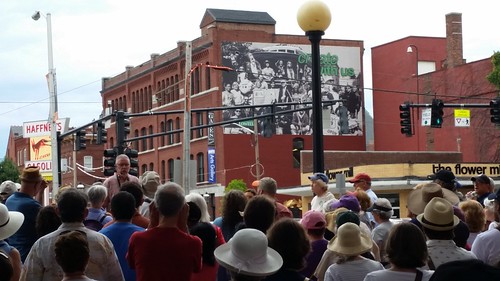Frederick Douglass and Lowell
The Boston Globe yesterday carried a story about the difficulties being encountered in erecting a statue in Boston honoring Frederick Douglass. Born into slavery in 1818, Douglass later escaped to freedom and became one of America’s foremost abolitionists in the years before, during, and after the Civil War.
Writing on Facebook yesterday about the Globe article, Bob Forrant, the UMass Lowell History Professor who led, along with one of his graduate students, a hugely successful Lowell Walks on Abolitionism in Lowell this summer, remarked that “Douglass spoke on several occasions in Lowell – – maybe we should think about doing something honoring him in Lowell?”

Bob Forrant leading Lowell Walk on Abolitionists, Aug 1, 2015
This is a great idea. The Civil War is a topic that is of great interest to most Americans which is fortunate because a good part of the causes of the conflict, the role of race in America, remains unresolved to this day. Lowell, especially in the decades leading up to the Civil War, is a remarkable case study in this struggle. The city’s entire reason for being was cotton and so many who derived economic benefits from the textile mills, owners and workers alike, were loath to do anything that might disrupt the slave system which is what brought all that raw cotton and the resulting economic benefits to Lowell. But the city was also a center of the abolitionist movement in Massachusetts with fiery abolitionist speeches, violent reactions, the Underground Railroad, fugitive slaves and slave catchers, racism, and editorials condemning racism. It was all here.
It’s unfortunate that we failed to highlight that portion of the city’s history more effectively during the just ended 150th anniversary of the Civil War. Still, it’s never too late for history so I’ll be in touch with Bob, who has been trying mightily to bring more attention to this phase of Lowell’s history, and we’ll see what we can do.
